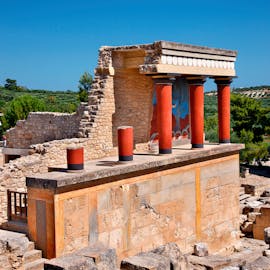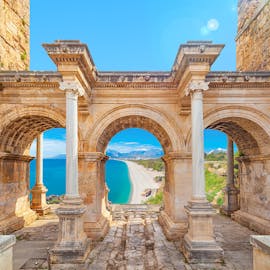Delphi Tickets
Experience ancient Delphi's magic. Visit the Temple of Apollo and connect with the past. Dive into history with our guided tours and transfers.
Bestseller












Delphi Archaeological Site & Museum Tickets with Audio Guide
Instant confirmation
Mobile ticket
Flexible duration
Audio guide
€17
Headout's Top Recommendations

Museums
Delphi Archaeological Site & Museum Tickets with Audio GuideInstant confirmation
Rated 4.57 out of 5.0 from 261 reviews.
€17
Free cancellation

Day Trips
From Athens: Guided Tour of Delphi Site & Museum Day Trip with Entry Tickets & VR HeadsetsInstant confirmation
Rated 4.82 out of 5.0 from 1265 reviews.
from €62
€55.80Save up to 10%
Free cancellation

Guided Tours
From Athens: Full-day Guided Tour of Delphi Site & Museum with Optional LunchInstant confirmation
Rated 4.52 out of 5.0 from 1891 reviews.
from
€48Select a Date
Duration
Flexible
10 hrs
10 hrs
Cancellation policy
These tickets can't be cancelled or rescheduled.
You can cancel these tickets up to 24 hours before the experience begins and get a full refund.
You can cancel these tickets up to 24 hours before the experience begins and get a full refund.
Top things to do in Athens
About Delphi Archaeological Site
The ancient city of Delphi rests on the hillside of Mount Parnassus. The Archaeological Site of Delphi and the Museum are a UNESCO World Heritage Site today, that draws plenty of mythology, history, and nature lovers. Step back in time as you wander amidst the ruins of Delphi, where people once gathered from far and beyond to listen to the Oracle of Delphi - the spokesperson of Apollo and to witness the Pythian Games.
Address
Delphi 330 54, Greece
Visitor’s per year
600000
Expected wait time - Standard
0-30 mins (Peak), 0-30 mins (Off Peak)
Unesco status
1987
Why visit Delphi Archaeological Site?
Did you know?
- In mythology, Delphi was considered the center or omphalos of the Earth, representing the point where two eagles, sent by Zeus from opposite ends of the world, met. As the myth goes, the wilderness of Delphi was chosen by Apollo as a spot to communicate with mortals. He slayed the evil serpent Python, who guarded Delphi and established a temple and oracle at Delphi.
- Along with the sanctuary of Apollo, Delphi also has a sanctuary of Athena, which contains the Tholos of Athena Pronaia. The Tholos is a circular building, characterized by its distinctive architecture with a central circular structure and surrounding columns. One of the most photographed spots in Delphi, its purpose remains unknown to this day.
- The ancient Temple of Apollo at Delphi was a center for worship. The temple was destroyed and rebuilt multiple times, with the existing ruins dating back to the 4th century BCE. It was the seat of the Oracle of Delphi or Pythia who channelled the god Apollo. It is said that the most important decisions in the Greek world were made upon consultation with the oracle at the Temple of Apollo.
- Akin to the Olympics, Delphi hosted the Pythian Games every four years, featuring athletic competitions, music, and drama. Participants and spectators thronged to Delphi and occupied the 6500-seater stadium and 5000-seater theater to watch the Games, in which, it is said, even Emperor Nero once participated.
- The Sacred Way that leads to the Temple of Apollo was originally lined with treasuries, constructed by Greek city-states to house offerings and ex-voto dedicated to Apollo and battle victories. Parts of these treasury buildings remain like the Corinthian Treasury, Siphnian Treasury, Athenian Treasury, Treasury of the Massaliots, and the Theban Treasury.





















